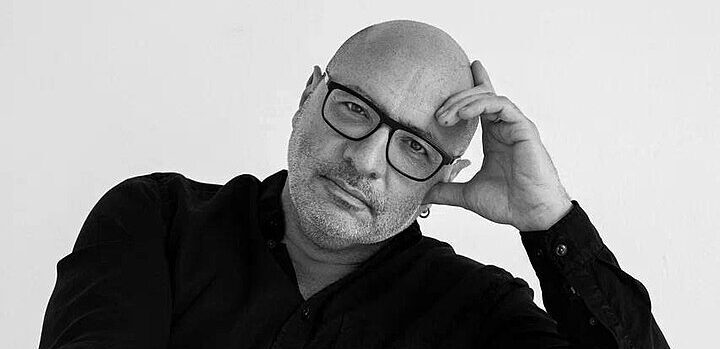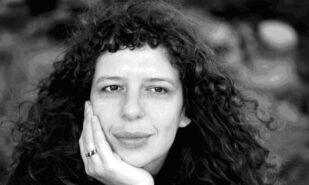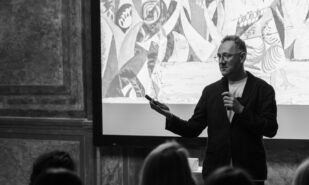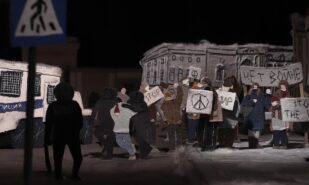Dima Zitzer — director, educator, founder of the INO Institute for Informal Education and the private school “Orange” — has staged the play Frau.Rehearsal. The play was written by journalist and playwright Artur Solomonov, and both roles are performed by Olga Romanova. Now, the show is coming to London, brought by British producer Masha MacMinn and her company UK Integration. This raw, honest, documentary-style drama will be performed on May 4 at the Marylebone Theatre. We spoke with Dima about the play, about children, and about courage.
Dima Zitzer: “We Have Earned the Right to Be Vulnerable”
How can you tell an adult from a child? Surely not by their wrinkles?
You really can’t — unless you take the technical side: adults are usually bigger in size and closer to death.
So, in that case, is directing similar to teaching?
Absolutely. And I say this not just because, in my life, those two things go hand in hand. Both are about interacting with people. Both are about internal connections, analyzing those connections — in other words, about reflection. About doubts, about the search for truth. The tools might differ, but they come from the same field, yes.
Do you use the same tools when working with teenagers on plays and when working with Olga Romanova on Frau?
I should clarify: I don’t only work with teenagers — it’s young people of various ages. But yes, if we’re talking about theatrical and pedagogical tools — absolutely. When I stage plays with kids, it’s essentially the same. They know very well that there will be no “kid discounts” in terms of professionalism. I’ve even told them, “Of course, we’re happy when your parents come to see the play. But we’re not doing this for them — they’ll be delighted no matter what.” And we’ve performed on professional stages.
Of course, there are things I try to shield children from due to their age. For example, Frau includes some explicit language — that’s not acceptable when working with kids. Adult plays may have graphic scenes, which my children’s plays never include. But beyond that, you can express everything through other means. I almost said that adult plays can be tougher than children’s ones — but actually, no. When it comes to imagery and emotional impact, not necessarily.
Would you say that the audience of Frau is like students, absorbing what’s said on stage? Or is it more of a conversation among equals?
Ah, see — that’s the thing! I’m not even sure the word “play” fits here. Technically, yes, but there’s something crucial: Olya’s not an actress, and that’s a big plus for this piece. When Artur Solomonov offered me this project, I’ll admit — I had doubts. I said, “Why not cast a professional actress? Someone talented and well-known?” He replied, “Let’s try it with Olga, and see how it goes.” And once I did — I didn’t want anyone else. Frau is documentary theater — you can’t rehearse real-time reflection.
So there’s only one way to do it: real, untheatrical contemplation happening right in the moment. In that sense, the audience are participants. They’re not observers — most of them get swept up in the same questions, the same reflections. We’ve had several performances already, and we’ve received lots of feedback about what people experience. I’m sure that if the show were structured to invite direct audience response, people would absolutely speak up. Many have said they wished they could.
That was going to be my next question — do people ever speak from the audience, as often happens in documentary theater?
No. I walk a fine line to make sure they don’t. They experience a flood of emotions, sometimes tears — but it’s important that they stay in their own internal space. Otherwise, it turns into a debate.
Did you read Artur Solomonov’s interview with Dora Naas before rehearsals began?
Yes. When it came out in 2013, I didn’t know Artur yet, but it struck me deeply. The text seemed powerful. But after the full-scale invasion of Ukraine, rereading it — it didn’t hit me the same way. Not that it became irrelevant, but the present has eclipsed the past. I’ve heard the same from audience members.
Are there parallels between Dora’s interview and Olga Romanova’s on-stage monologue?
Not exactly. You could say Dora’s memories spark Olga’s reflections — that’s more accurate. Honestly, we don’t always know in advance what text will emerge.
So it’s partly improvised?
We know the structure, but there’s a lot of what I’d call conditional improvisation. Why conditional? If a professional actress were doing it, we’d call it improvisation. But with Olga Romanova, it’s an ongoing search.
The performance is in Russian, without subtitles?
For now, yes. No plans for translation yet — we’d need a top-tier interpreter for that, which is quite expensive.
Have you and Olga talked about the vulnerability of sharing such personal experiences on stage? Does that vulnerability create a kind of invulnerability?
You see, this text is really Olga’s — she says exactly what she wants to say. That’s key. Sometimes I challenge her, push to see how deep she’s willing to go — carefully, of course. Honestly, I hate the “table work” stage of rehearsals — the Stanislavski-style “sit and analyze.” I prefer: “On stage! Let’s play — we’ll discover it in the doing.” But with Frau, we talked a lot — still do. We had to find that raw nerve — that’s where the value lies. Because if we just talk about Dora, well — there have been plenty of Doras…
I really believe it’s about vulnerability. That’s where the most interesting stuff is born. Olga sometimes says things that surprise even herself — and definitely surprise me. Sometimes, mid-performance, she stumbles onto a topic that wasn’t there before. I want us all to be vulnerable. We’ve earned that right.
Earned?
The war began — and yes, we earned it. We earned it with our complicity — 100% of Russian speakers, excluding Ukraine. Our story is about responsibility and guilt — guilt and responsibility. Yes, we’re responsible for our lives, even the ugly, unpleasant parts. And for the dark corners we don’t want to look at — they’re there for all of us. We’d rather just cover them up and pretend they’re not there.
So Frau is essentially about peeking behind that curtain?
Exactly. And we must be gentle with the audience. They’re not to blame for coming — we’re grateful they did. So in a way, Olga does it for them — she pulls back her own curtain. The key is: we only speak for ourselves. If viewers find connections — great.
In that context, what helps you personally not to fall into despair or hopelessness?
Oh, believe me — I’ve been there more than once in these three years. What helps is — and I know this sounds lofty — knowing I’m needed. That’s a huge part of my work: very real, tangible help to people in Ukraine, and beyond. Specific kids, adults, educators. That, probably, is what keeps me going.
Your podcast is called “To Love or to Teach.” In these past three years, where does the comma go? Is there ever so much pain that there’s no room left for love?
If someone’s got no place left for love, there’s no advice I can give them. I can only empathize. But often, that emptiness comes from passivity — from the question “But what can I do?” That question, so cherished by Russian authorities. They taught people to think: “I’ll never know the truth. Others know better. I don’t care about politics. I don’t understand any of it.” But look around — help someone who needs it. Take a concrete step. The idea that we can’t do anything — that’s a lie, excuse my bluntness. So let’s put off debating the meaning of love for now. We all have the power to act, and that’s amazing. There are people who desperately need that action. That’s all.
In the interview, Dora says: “It’s hard for a young person to go against the current.” Do you think that after WWII, once she began to understand what had happened, people just explained it all away and she went right back with the flow?
Yes, absolutely. That’s one of those moments when I can only say: yes. Olga and I studied that interview, watched related materials. There’s no evidence — apart from Dora’s words — that her thinking actually changed. I’m not here to pin her down — but you’re right. The mainstream is a powerful force. She was in a different society, maybe saw things differently. But numerous surveys from late 1970s Germany show that most “Doras” still thought the same as they did thirty-five years earlier.
What does a person need inside to even notice that they’re conforming — let alone resist it?
Critical thinking. The habit of questioning, of not doing things on autopilot. The habit of doubt and reflection.
So what makes a person brave?
In The Idiot, Dostoevsky has Aglaya and Prince Myshkin sitting on a bench discussing courage and cowardice. She asks if he knows what fear is — he says yes. She replies, “Then you’re a coward.” He answers: “Maybe not — because someone who’s afraid but doesn’t run away isn’t a coward. A coward is someone who’s afraid and runs.” I won’t sign that in blood, but it popped into my head. I guess courage is a kind of minimal loyalty to yourself, followed by action. But I’m not here to demand heroism from people — truly. At one point, I told myself: this is a time of testing, but I’d rather not be tested at all. Even though I try to face it honestly, I’d prefer to avoid it. And I don’t want readers thinking that resisting means you’re brave, and everyone else isn’t. I don’t believe everyone has to be brave. People have a right to be different.
Do you teach your students to reflect on these topics?
No, no, no — I don’t think it works like that. Grabbing someone by the button and saying, “Now we’ll talk about deep things!” — that’s not my style. Nor is saying someone has to be brave or resilient or whatever. Reflection comes from reflection — from asking questions, from searching for answers. Any question that matters to them — or to me — is valid. That’s rule number one.
You’re opening a new school, OMA. Are the children you’re working with now different from those before the war?
Broadly speaking — no. The value system shifts, sure, and sometimes it becomes tragic. But if we’re talking specifically about Ukrainian children, then yes — fundamentally different. 100% of Ukrainian kids have suffered real trauma, in the literal sense. I have a whole chapter about this in my book Love in Times of Turbulence. It’s not a courtesy to Ukraine — it’s reality. These kids’ lives changed in an instant, radically — whether they’re still in Ukraine or not. Their whole world shifted. So yes, they’re different now. Sadly, yes.
I’m not comparing, but do you see signs of trauma in children who left Russia after the war started?
No — it’s a different thing. We have to be precise with terms. Trauma is a very specific word — a sudden, sharp change to a child’s entire life and development. Are there traumatized kids in other groups, including Russians? Of course. But you have to use the right professional lens. Russian parents — especially those who were mindful — often had time to make decisions, to plan, to cushion the fall. Again, I’m not saying Ukrainian kids deserve pity and Russian ones don’t. But it’s not the same. You asked about groups — and with Ukrainian children, I can say 100% are traumatized. I’d advise colleagues to remember that — we must remember it. As for Russian children abroad — sure, they may experience cultural shock, confusion, hard questions — and trauma, even. But it’s simply not the same. Honestly.
Have the texts you read with kids at school changed? I mean, math stays the same — but literature…
Well, I haven’t read texts with students in a while, but hypothetically — yes. Classics always matter — and I don’t just mean 19th-century ones, but any text that helps us understand ourselves. Including those written just a year ago. Today, there are tons of important new works we need to engage with. There’s no point sticking to a program from even twenty years ago, let alone fifty. There’s profound stuff in rap, for instance. Or — though not for children — Sorokin’s novel Heritage is a prime example of modern Russian-language literature. But again, this is somewhat hypothetical — our school opens in the autumn. Ask me in a year, and I’ll have new experiences to share — literary and theatrical. We’ll see what matters to them, and to me.





